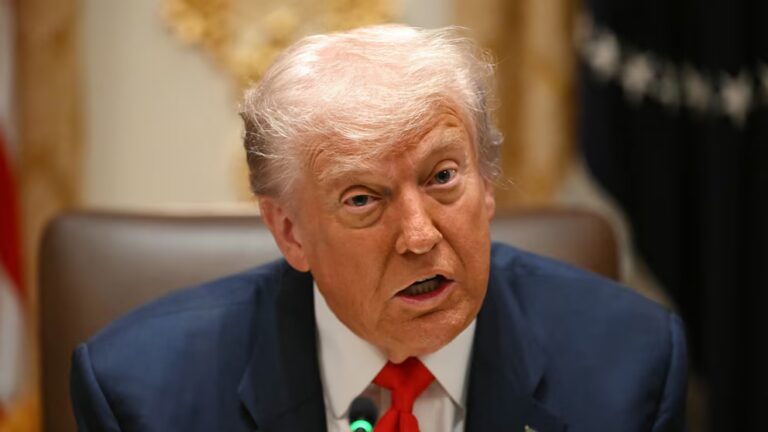
Donald Trump’s second-term health care agenda would hinge on the Supreme Court.
If the Court sides with a group of conservative states that claim the entirety of the Affordable Care Act is unconstitutional, millions of Americans could lose their health insurance in the middle of the Covid-19 pandemic. The White House and Congress would have to try to do something to stop such a calamity.
“If the court knocks down all or part of the law, I think that’s a game changer in terms of what the priorities are,” Kim Monk, a founding partner of Capital Alpha Partners, an investment research firm based out of Washington, DC, told me. “That forces some sort of action or a fight.”
If the Supreme Court upholds the ACA, however, Trump’s health care agenda could become modest — and possibly even bipartisan. The administration has come close to striking deals on bipartisan health care bills with the current Congress, and Trump may be tempted to try to get those across the finish line to secure a more lasting legacy in this policy area.
“I would hope one of the things they’ve learned is [that] what they did in the first term is very much at risk. It’s all executive action,” Doug Holtz-Eakin, president of the right-leaning American Action Forum, told me. “Getting things done in legislation will be a bigger priority. Drug-price bills and surprise-billing bills could get over the finish line with real White House effort.”
Although that sounds potentially optimistic, that would require Trump to succeed where he has already failed. Trump’s White House has proven itself ill-equipped to work well with either congressional Democrats or Republicans. Obamacare repeal was a disaster; deals on prescription drug prices and surprise medical bills fizzled.
As Holtz-Eakin summarized it: “They have failed to pass any significant legislation on things they care about.”
I spoke with a half-dozen Republican lobbyists and conservative wonks for this story. One thing became clear to me: Any optimism about what a second Trump term would mean for US health care hinges on the president mustering a dealmaking savvy with Congress he has yet to display during his first three and a half years in office.
How Trump could respond if the Supreme Court overturns Obamacare
Trump’s second term would start at the Supreme Court, which has scheduled oral arguments in Texas v. Azar for November 10, 2020. Republican-led states and the Justice Department have urged the Court to invalidate the ACA in its entirety, arguing that because the individual requirement has since been repealed, the rationale used to save the mandate and uphold the law in 2012’s National Federation of Independent Business v. Sebelius (for which Chief Justice John Roberts wrote the majority opinion) no longer applies — and as a result, Obamacare must fall.
That means all of it: Medicaid expansion, which has covered more than 12 million people; the insurance marketplaces, where 11.4 million people have purchased coverage, most of them with the help of federal subsidies that would also be nixed; protections for preexisting conditions; and free preventive care. The US would be starting over, as if the last 10 years of health policy and coverage expansion never happened.
In that scenario, Trump and Congress (having either flipped back to full Republican control or with a Democratic House) would have to figure out what to do next — and there is no single consensus on the right about the best way to reform health care.
Some conservatives still support a framework similar to that of 2017’s Graham-Cassidy bill, which would effectively take the money appropriated by Obamacare and turn it into block grants for states to spend as they see fit (and which would lead to millions of people losing coverage, according to estimates from the Congressional Budget Office). Others prefer to rebuild something closer to the ACA — as GOP Rep. Bruce Westerman’s bill would do — but with important tweaks, such as allowing insurers to charge older people higher premiums (to make insurance more affordable for younger people). There would be big changes to the Medicaid program under Westerman’s plan, though, with states having the option to adopt spending caps and move the Medicaid expansion population onto the private insurance markets.
“It’s an alternative form of the individual market, with important technical differences,” Avik Roy, president of the right-leaning Foundation for Research on Equal Opportunity and an adviser on the Westerman bill, told me. “We’d end up in a pretty similar place, but with a reformed individual market.”
However, most people — including Roy and most of other conservatives I spoke with — don’t expect the Supreme Court to nullify Obamacare entirely. At most, they anticipate a narrow decision that strikes down core protections for preexisting conditions along with the mandate, but leaves much of the law (including premium subsidies and Medicaid expansion) in place.
That’s still a significant political event. Those protections are very popular, in no small part because an estimated 54 million Americans have a preexisting condition, and many of them would struggle to buy insurance on their own without those rules. Under that scenario, Republicans could opt for a narrower fix. During the current Congress, when Democrats tried to force the GOP to take tough votes on health care, some GOP lawmakers introduced a resolution that said if the Supreme Court overturned the rules on preexisting conditions, they would vote to restore them sans mandate.
Roy thinks that’s a likely starting point for Republicans should the Court issue a narrow ruling. Although some people more committed to conservative health care ideology might want to push farther, he said, he also believes most elected Republicans “are totally fine with guaranteed issue and would vote to reinstate it.”
The political incentives to maintain health care for 25 million Americans would be overwhelming, and would surely motivate Trump and Congress to make a deal. But the president is playing with fire: He came into office with health care as the top item on the GOP agenda and full Republican control of Congress, yet he still failed to reach a consensus. The stakes would be much higher the second time around.
Even if the Supreme Court spares Trump a manufactured health care crisis, his second-term agenda likely depends on a congressional panache he hasn’t shown thus far.
What a bipartisan health care agenda could actually look like in a second Trump term
There’s actually quite a long list of areas in which both Democrats and Republicans want to act on health care, based on my conversations.
Everybody wants to reduce prescription drug prices, and Trump has often sounded more like a Democrat than a Republican on that issue, favoring aggressive intervention by the federal government. Surprise medical bills remain the source of cross-party outrage, and there was movement late last year toward a bipartisan fix, which came up short but could be revived.
“I think if Trump is reelected on drug pricing, there will be another push for legislative reform,” Monk said. “There actually is a lot of common ground. … I don’t see Trump totally cruising on that issue.”
There are also new issues that have cropped up during the coronavirus pandemic and require longer-term solutions — and likely congressional action. The Trump administration has made regulatory changes to better compensate telehealth visits for doctors, but those would lapse unless they are written into federal statute. The supply chain issues that have contributed to shortages of personal protective equipment and testing supplies could also be addressed through Congress, and there could be bipartisan interest in preventing the problems of the last few months from repeating themselves in a similar crisis.
“The places they might want to go and that would represent significant steps forward really are legislative,” Holtz-Eakin said. “All those things would strike me as sensible things to try to get done, even if they don’t sound as grand as repeal and replace.”
Of course, any of those items would require a deal between the White House and congressional Republicans — and likely Democrats, too, either because they control the House or because their votes are needed to get the 60 required to advance bills in the Senate. And Trump, despite his dealmaker reputation, has not had a landmark health care agreement in his first term.
Obamacare repeal fell through. As Politico chronicled in December 2019, Trump initially greeted House Speaker Nancy Pelosi’s drug-pricing plan with warmth. It shared many features of his own proposal, such as pegging US drug prices to those paid in other countries and establishing an out-of-pocket cap in Medicare for prescription drugs. But as Democrats pressed forward with their impeachment inquiry, Trump pulled back. He lended his support to a competing bill in the Senate, which did make its way out of committee over drug companies’ objections — “a remarkable piece of progress,” as Roy put it, given that pharma usually gets its way on Capitol Hill.
But that legislation still hasn’t been brought up on the Senate floor — likely the result of reticence on the part of Senate Majority Leader Mitch McConnell — and Trump has not shown a sustained interest in pressuring the upper chamber to act.
“What’s held up in the Senate Finance bill, it hasn’t been Dems per se,” Roy said. “It’s believed that McConnell has not wanted to bring it to the floor, but it likely would pass on a straight majority vote. It probably could get 60 votes.”
So the opportunities would be there. But Trump would have to close a deal. The same principle applies to surprise billing. The White House threw support behind an emerging bipartisan consensus on how to prevent patients from being hit with thousands of dollars in bills for out-of-network care, but a bill never passed. Congress bears much of the blame for that failure, with Democrats divided against themselves and McConnell again playing his cards close to his chest, but more aggressive lobbying from the White House could conceivably help in getting such an agreement done.
But factoring in the political landscape likely to result from Trump winning a second term, the lobbyists I spoke to are skeptical there would be any appetite among Democrats to work with the White House, since the president is already considered toxic when it comes to congressional negotiations.
“They don’t let him get anywhere close to House or Senate Democrats because that relationship is so incredibly radioactive,” one lobbyist, who spoke to me on the condition of anonymity, said. “It kills all that comes near it.”
Absent congressional action, Trump’s health care agenda in a potential second term will likely focus on following through on the executive actions from his first term, many of which are still subject to litigation.
“I struggle to find a world where the drug pricing regulations don’t spend the vast majority of the administration’s final four years in court,” the lobbyist said. “That’s how long it would take to drag through.”
And as the Trump administration has worked overtime to roll back many of Obama’s executive initiatives or using their administrative authority on the ACA, they should be more familiar than most about how fleeting executive actions can be.
The Trump presidency has been nothing if not unpredictable. The Supreme Court could ensure that applies to the next four years of health care policy as well.
New goal: 25,000
In the spring, we launched a program asking readers for financial contributions to help keep Vox free for everyone, and last week, we set a goal of reaching 20,000 contributors. Well, you helped us blow past that. Today, we are extending that goal to 25,000. Millions turn to Vox each month to understand an increasingly chaotic world — from what is happening with the USPS to the coronavirus crisis to what is, quite possibly, the most consequential presidential election of our lifetimes. Even when the economy and the news advertising market recovers, your support will be a critical part of sustaining our resource-intensive work — and helping everyone make sense of an increasingly chaotic world. Contribute today from as little as $3.
Sourse: vox.com






